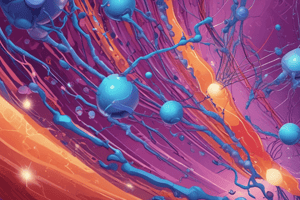Podcast
Questions and Answers
Match the liver medications with their classifications:
Match the liver medications with their classifications:
Peginterferon alfa-2b = Immune Stimulants Boceprevir = Antiviral Agents Ribavirin = Antiviral Drugs Thiamine = Supplements
Match the therapeutic uses with the respective medications:
Match the therapeutic uses with the respective medications:
Hepatitis B and C = Peginterferon alfa-2a Hepatitis C = Glecaprevir Deficiencies = Thiamine
Match the mechanisms of action with the corresponding medication types:
Match the mechanisms of action with the corresponding medication types:
Modify the immune response = Interferons Block protease activity = Protease Inhibitors Inhibit viral DNA replication = Antiviral Drugs Replace in deficiency states = Vitamins
Match the adverse effects with their related medication types:
Match the adverse effects with their related medication types:
Match the drug exemplars with their classifications:
Match the drug exemplars with their classifications:
Match the types of adverse effects to their descriptions:
Match the types of adverse effects to their descriptions:
Match the components of treatment with their associated conditions:
Match the components of treatment with their associated conditions:
Match the primary action with its associated medication category:
Match the primary action with its associated medication category:
Flashcards are hidden until you start studying
Study Notes
Liver Medications: Immune Stimulants
- Interferons are proteins that modify the immune response and stimulate interferon receptor sites on non-invaded cells.
- Interferons produce antiviral proteins that prevent viruses from entering the cell.
- Interferon medications are used to treat Hepatitis B and C.
- Common adverse effects of interferon therapy include flu-like symptoms, bone marrow suppression, cardiotoxicity, dyspnea, alopecia, and GI upset.
- Monitor complete blood count (CBC) levels, cardiac function, and liver function during interferon therapy.
Liver Medications: Antiviral Agents - Protease Inhibitors
- Protease inhibitors are antiretroviral medications that block protease activity, rendering HIV particles unable to fuse with and inject themselves into a cell.
- Protease inhibitors are used to treat Hepatitis C.
- Common adverse effects of protease inhibitors include gastrointestinal (GI) effects, changes in liver function, elevated cholesterol and triglyceride levels, fat redistribution, and Stevens-Johnson syndrome.
Liver Medications: Antiviral Drugs
- Antiviral drugs inhibit viral DNA replication by competing with viral substrates to form shorter, non-effective DNA chains.
- Antiviral drugs are used to treat Hepatitis C.
- Common adverse effects of antiviral drugs include nausea, vomiting, headache, depression, paresthesia, neuropathy, rash, hair loss, and renal dysfunction.
Liver Medications: Supplements
- Thiamine is a vitamin used to treat vitamin deficiencies.
- Thiamine is required for carbohydrate metabolism.
- Reactions and side effects from thiamine supplementation are extremely rare.
Studying That Suits You
Use AI to generate personalized quizzes and flashcards to suit your learning preferences.



